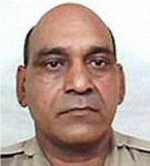 The Delhi high court on Friday asked the city police to file a status report on its probe into the circumstances leading to death of Constable Subhash Tomar, who was allegedly assaulted by eight youth protesters during the anti-rape stir.
The Delhi high court on Friday asked the city police to file a status report on its probe into the circumstances leading to death of Constable Subhash Tomar, who was allegedly assaulted by eight youth protesters during the anti-rape stir.Justice G P Mittal, who also issued notices to the ministry of home affairs and the Delhi government, asked the police to file its report within a week after taking note of the plea of eight youths for quashing of the FIR against them in the constable's death case.
Shantanu Kumar and seven other accused have moved the high court for quashing of the FIR lodged on December 23, 2012 under penal provisions of attempt of murder and rioting.
The police later invoked section 302 (murder) of the Indian Penal Code against them after Tomar's death at a hospital here.
"The whole city is scared as a sister was sexually assaulted and the brothers who came out on roads to protest were made accused by the Delhi police.
The head of the Delhi police needs to be called here in the court and asked to give reasons as to how he made false statements in his press conference about the whole case," said the counsel for accused.
He also referred to the alleged dissimilarities in the statements of Delhi Police Commissioner Neeraj Kumar, the two eyewitnesses and a doctor of Ram Manohar Lohia Hospital to buttress his allegation that Tomar collapsed on his own and was not assaulted by the accused protestors.
The counsel said the video footage of the Delhi Metro Rail Corporation amply suggests that two accused, Kailash Joshi and his brother Amit, were travelling in a metro at the time of the incident and their false implication in this case raises a serious issue.
Taking note of the submission, the court asked the city police to file the report and fixed the matter for further hearing on January 15. It also allowed the accused to amend their petition to insert an additional prayer for the Central Bureau of Investigation probe in the whole incident.
Meanwhile, the court did not issue notice on a separate plea of Gaurav Kumar Bansal, an advocate seeking CBI probe into the constable's death.
"I am not issuing a notice on this petition. It is simply re-notified for January 15," Justice Mittal said.
Tomar, who died on December 25 at RML Hospital, was posted at Karawal Nagar police station in New Delhi and was called to help police in maintaining law and order at India Gate during the ant-rape protests on December 23.
Besides Amit, Kailash Joshi and Shantanu Kumar, Nafees, Shankar Bisht, Nand Kumar, Abhishek and Chaman Kumar have been made accused for allegedly taking part in protests which later turned violent and in which Tomar had allegedly got injured and later succumbed to his injuries. All eight are now facing murder charges.
The eight accused were granted bail by the trial court on December 24.
The police had claimed that hooligans had taken over the peaceful protest and violence erupted at India Gate in which 78 policemen and 65 protesters were injured. Various PCR vans and Delhi Transport Corporation buses were also damaged by the violent protesters.
Seeking a CBI probe into the incident, the plea filed by Bansal, had alleged that the eyewitnesses' accounts indicate that the constable had died "a natural death" and the police "created" its own story to ensure that the protest "die down".
"As per the statements given by eyewitness namely Paulin, at the time when Tomar collapsed there was no crowd and no external injuries were seen on his body," the petition said.






 © 2025
© 2025